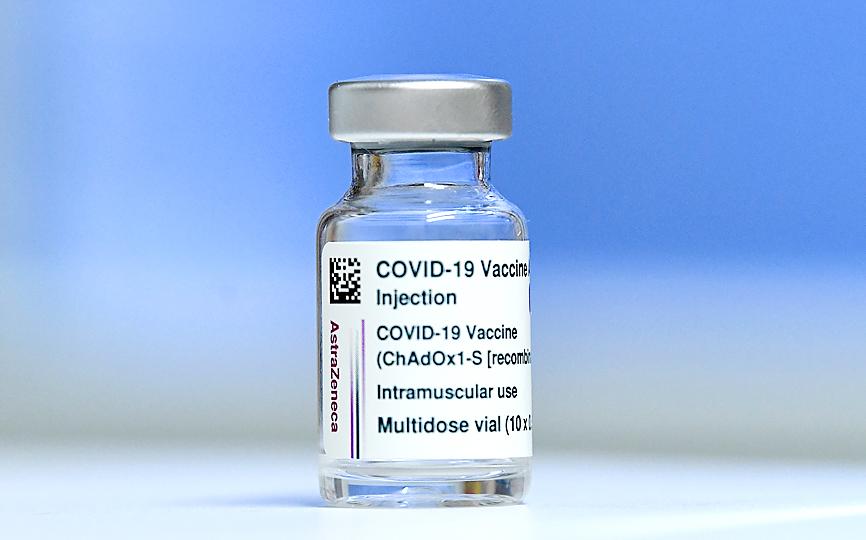The WHO on Monday gave emergency-use approval to AstraZeneca’s COVID-19 vaccine, meaning distribution can start to poorer countries starved of doses to fight the pandemic.
The AstraZeneca-Oxford jab forms the bulk of batches being lined up through COVAX, the global program aimed at procuring and shipping out vaccines equitably around the world, regardless of wealth.
It is only the second COVID-19 jab to have received WHO authorization, after the Pfizer-BioNTech vaccine.

Photo: Reuters
“The WHO today listed two versions of the AstraZeneca-Oxford COVID-19 vaccine for emergency use, giving the green light for these vaccines to be rolled out globally through COVAX,” the UN health agency said in a statement.
The two versions given the seal of approval are being produced by the Serum Institute of India, and by SK Biopharmaceuticals Co in South Korea.
Separate reviews were needed for each production process, although the vaccine is the same.
“Countries with no access to vaccines to date will finally be able to start vaccinating their health workers and populations at risk, contributing to the COVAX facility’s goal of equitable vaccine distribution, but we must keep up the pressure to meet the needs of priority populations everywhere and facilitate global access,” WHO Assistant Director-General Mariangela Simao said. “To do that, we need two things — a scale-up of manufacturing capacity and developers’ early submission of their vaccines for WHO review.”
The organization’s emergency-use listing procedure assesses the quality, safety and efficacy of COVID-19 vaccines, and is a prerequisite for vaccines in the WHO coled COVAX facility.
AstraZeneca vaccines from India and South Korea made up almost all of the initial 337.2 million doses lined up for COVAX’s first wave of distribution, which is set to begin later this month.
About 145 participating economies are set to receive enough doses to immunize 3.3 percent of their collective population by the middle of this year.
Both vaccines require two injected doses.
Meanwhile, South Africa has asked the Serum Institute of India to take back the 1 million COVID-19 vaccine doses the company had sent early this month, the Economic Times reported yesterday, a week after the country said that it would put on hold use of AstraZeneca’s shot in its vaccination program.
One million doses of the COVID-19 vaccine landed in South Africa last week and 500,000 were due to arrive in the next few weeks.
South Africa’s health minister had said that the government might sell doses of AstraZeneca’s vaccine, after the country paused its rollout following a small clinical trial that showed it offered minimal protection against mild to moderate illness from the 501Y.V2 coronavirus variant dominant in the country.
AstraZeneca has said its vaccine appears to offer only limited protection against mild disease caused by the South African variant, based on data from a study by South Africa’s University of the Witwatersrand and the UK’s University of Oxford.

AIR SUPPORT: The Ministry of National Defense thanked the US for the delivery, adding that it was an indicator of the White House’s commitment to the Taiwan Relations Act Deputy Minister of National Defense Po Horng-huei (柏鴻輝) and Representative to the US Alexander Yui on Friday attended a delivery ceremony for the first of Taiwan’s long-awaited 66 F-16C/D Block 70 jets at a Lockheed Martin Corp factory in Greenville, South Carolina. “We are so proud to be the global home of the F-16 and to support Taiwan’s air defense capabilities,” US Representative William Timmons wrote on X, alongside a photograph of Taiwanese and US officials at the event. The F-16C/D Block 70 jets Taiwan ordered have the same capabilities as aircraft that had been upgraded to F-16Vs. The batch of Lockheed Martin

GRIDLOCK: The National Fire Agency’s Special Search and Rescue team is on standby to travel to the countries to help out with the rescue effort A powerful earthquake rocked Myanmar and neighboring Thailand yesterday, killing at least three people in Bangkok and burying dozens when a high-rise building under construction collapsed. Footage shared on social media from Myanmar’s second-largest city showed widespread destruction, raising fears that many were trapped under the rubble or killed. The magnitude 7.7 earthquake, with an epicenter near Mandalay in Myanmar, struck at midday and was followed by a strong magnitude 6.4 aftershock. The extent of death, injury and destruction — especially in Myanmar, which is embroiled in a civil war and where information is tightly controlled at the best of times —

China's military today said it began joint army, navy and rocket force exercises around Taiwan to "serve as a stern warning and powerful deterrent against Taiwanese independence," calling President William Lai (賴清德) a "parasite." The exercises come after Lai called Beijing a "foreign hostile force" last month. More than 10 Chinese military ships approached close to Taiwan's 24 nautical mile (44.4km) contiguous zone this morning and Taiwan sent its own warships to respond, two senior Taiwanese officials said. Taiwan has not yet detected any live fire by the Chinese military so far, one of the officials said. The drills took place after US Secretary

THUGGISH BEHAVIOR: Encouraging people to report independence supporters is another intimidation tactic that threatens cross-strait peace, the state department said China setting up an online system for reporting “Taiwanese independence” advocates is an “irresponsible and reprehensible” act, a US government spokesperson said on Friday. “China’s call for private individuals to report on alleged ‘persecution or suppression’ by supposed ‘Taiwan independence henchmen and accomplices’ is irresponsible and reprehensible,” an unnamed US Department of State spokesperson told the Central News Agency in an e-mail. The move is part of Beijing’s “intimidation campaign” against Taiwan and its supporters, and is “threatening free speech around the world, destabilizing the Indo-Pacific region, and deliberately eroding the cross-strait status quo,” the spokesperson said. The Chinese Communist Party’s “threats